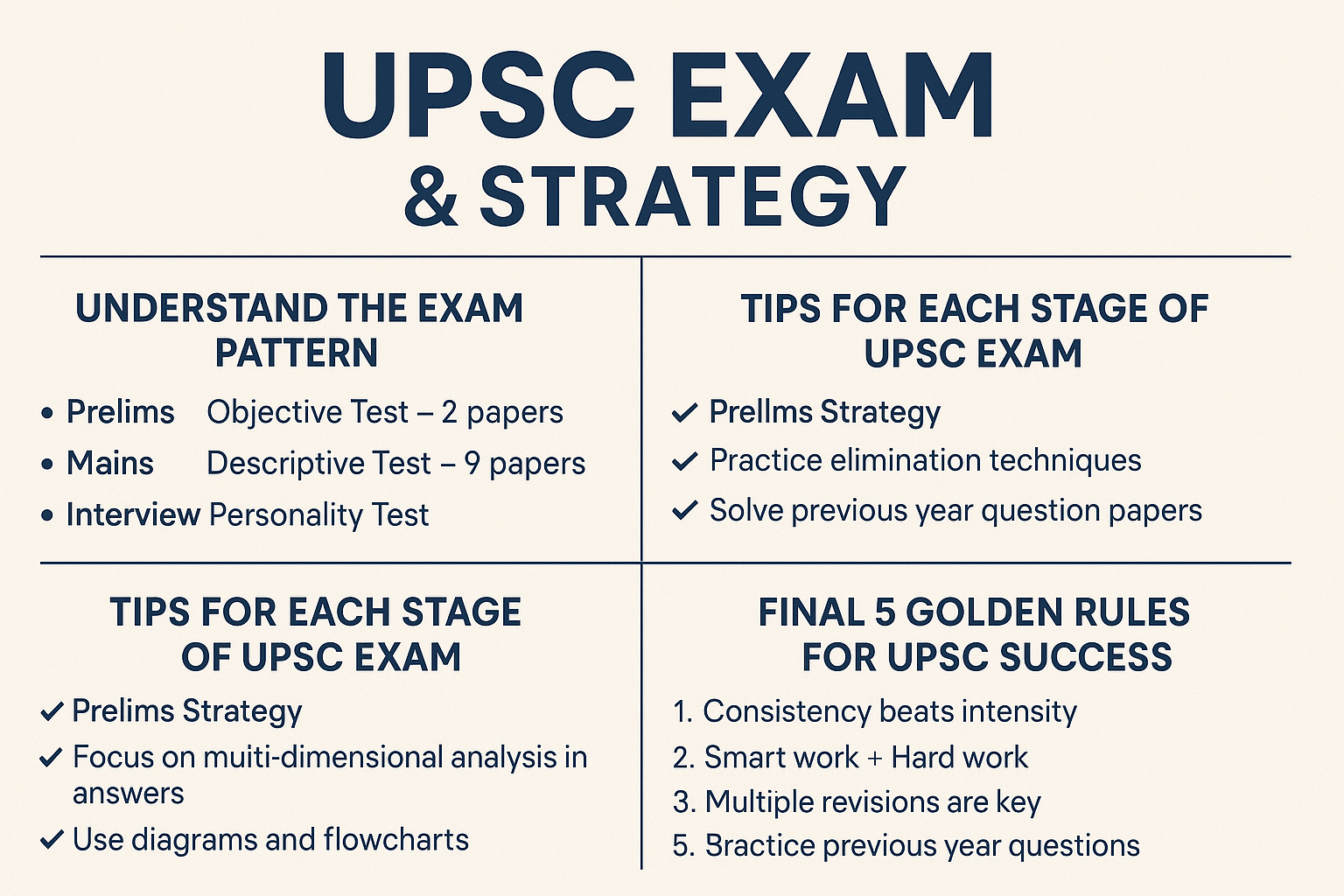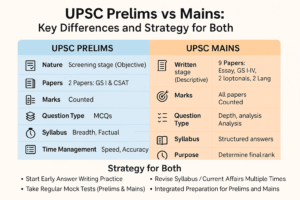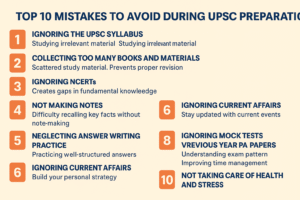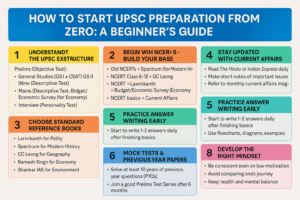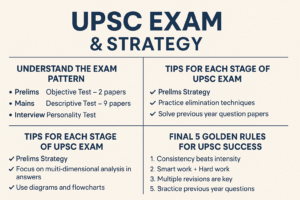The Union Public Service Commission (UPSC) Civil Services Examination (CSE) is regarded as one of the toughest competitive exams in India. Every year, lakhs of candidates appear for it with the dream of becoming IAS, IPS, IFS, or IRS officers. To crack this prestigious exam, a well-planned preparation strategy, consistent effort, and the right guidance are essential.
This article provides a comprehensive UPSC exam preparation strategy, covering Prelims, Mains, and Interview, along with practical tips and resources for aspirants.
Understanding the UPSC Exam Pattern
Before starting preparation, every aspirant must clearly understand the structure of the exam:
1. UPSC Prelims (Objective Test)
General Studies Paper I: History, Geography, Polity, Economy, Environment, Science & Current Affairs.
General Studies Paper II (CSAT): Aptitude, Comprehension, Logical Reasoning, Decision Making.
Qualifying Nature: Paper II is qualifying (33% required), while Paper I marks decide Prelims selection.
2. UPSC Mains (Descriptive Test)
9 Papers in Total: 2 Language Papers (qualifying), 1 Essay, 4 General Studies Papers, 2 Optional Papers.
Focus: Analytical writing, conceptual clarity, and interlinking of subjects.
3. UPSC Personality Test (Interview)
Panel Interaction: Tests personality, awareness, and decision-making.
Marks: 275, making a huge difference in final ranking.
Step-by-Step UPSC Preparation Strategy
Step 1: Build Strong Foundations
Start with NCERTs (Class 6–12) for History, Geography, Polity, Economy, and Science.
Read them multiple times for conceptual clarity.
Step 2: Standard Reference Books
Polity – Laxmikanth
History – Spectrum Modern India, NCERTs for Ancient & Medieval
Geography – NCERTs + GC Leong
Economy – Ramesh Singh + Budget & Economic Survey
Environment – Shankar IAS Book
Current Affairs – Daily Newspaper (The Hindu/Indian Express) + Monthly Magazines
Step 3: Current Affairs Integration
Make daily notes from newspapers.
Revise monthly compilations from reputed sources.
Relate current issues with syllabus topics (e.g., linking climate change with Environment & Geography).
Step 4: Answer Writing Practice
Start Mains answer writing early (after completing basics).
Join a test series for structured practice.
Use Introduction – Body – Conclusion (IBC) format.
Step 5: Regular Mock Tests
Prelims: Attempt at least 40–50 full-length mock tests.
Mains: Write 2–3 answers daily; take weekly mock tests.
Pros: Helps in time management and accuracy.
Cons: Overdependence on test series may reduce focus on self-study if not balanced.
Step 6: Revision Strategy
Revise NCERTs and notes multiple times.
Last 2–3 months before Prelims should be dedicated to revisions and mock practice.
For Mains, keep short notes for quick revision.
Tips for Each Stage of UPSC Exam
Prelims Strategy
✅ Practice elimination techniques.
✅ Solve previous year question papers.
✅ Balance static subjects with current affairs.
Mains Strategy
✅ Focus on multi-dimensional analysis in answers.
✅ Use diagrams, flowcharts, and maps.
✅ Practice essay writing regularly.
Interview Strategy
✅ Stay calm and confident.
✅ Read your Detailed Application Form (DAF) thoroughly.
✅ Keep updated with national and international issues.
Pros & Cons of Different Preparation Approaches
Self-Study Approach
✅ Flexibility, cost-effective, independent learning.
❌ Lack of structured guidance, risk of missing important topics.
Coaching Approach
✅ Expert guidance, study materials, peer learning.
❌ Expensive, risk of dependency on classes without personal effort.
Hybrid Approach (Self-study + Coaching/Online Resources)
✅ Balanced preparation, structured guidance with self-paced study.
❌ Requires strong self-discipline.
Final 5 Golden Rules for UPSC Success
Consistency beats intensity – study regularly.
Smart work + Hard work is the winning combination.
Multiple revisions are more important than covering too many books.
Practice previous year questions to understand UPSC’s demand.
Stay mentally strong – patience and perseverance are key.
FAQs on UPSC Exam Preparation & Strategy
Q1. How many hours should I study daily for UPSC?
👉 On average, 6–8 hours of focused study is recommended. However, quality matters more than quantity.
Q2. Is coaching mandatory for UPSC?
👉 No, many toppers have cracked UPSC without coaching. Coaching helps with guidance but self-study is equally effective.
Q3. When should I start answer writing?
👉 Start once you complete the NCERTs and basic standard books. Early answer writing improves expression and clarity.
Q4. How many attempts are allowed in UPSC?
👉 General: 6 attempts till 32 years; OBC: 9 attempts till 35 years; SC/ST: Unlimited attempts till 37 years.
Q5. Which is the best optional subject for UPSC?
👉 The best optional depends on your interest, background, and availability of resources. Popular choices include Public Administration, Geography, Sociology, and History.
Q6. How do I balance Prelims and Mains preparation?
👉 Prepare for both simultaneously. Focus on Prelims in the last 3 months before the exam, but build Mains writing skills throughout the year.
Q7. How many months are required to prepare for UPSC?
👉 On average, 12–18 months of dedicated preparation is ideal. But with smart strategy, it can be reduced.
✅ SEO Keywords Integrated: UPSC exam preparation, UPSC strategy, IAS coaching, best UPSC preparation tips, UPSC prelims strategy, UPSC mains answer writing, UPSC current affairs preparation, IAS exam tips, UPSC interview guidance.

